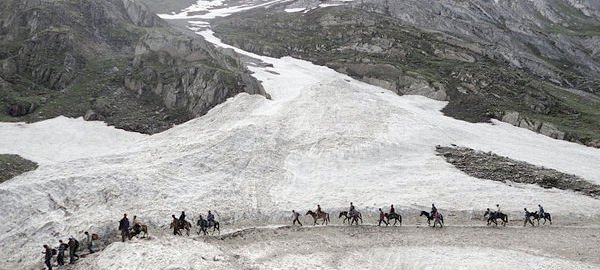Health Advisory for Amarnath Yatra
Amarnath Yatra Health Advisory
The health advisory for visiting the Amarnath Cave is issued by the Amarnath Shrine Board and complying with it is a must for every pilgrim.
As Amarnath Cave is located at an elevation of 12,760 ft. /3,888 m, the trek to the holy temple exposes you to extreme cold, low humidity, increased ultra violet radiations, and reduced air pressure. Under these extreme weather conditions, one of the most common risks that trekkers face on Amarnath Yatra is the development of Acute Mountain Sickness(AMS).
AMS is a physical distress that affects the brain and the lungs which occurs when you ascend to altitudes over 8,000 ft. /2,500 m.
Along with AMS, on your journey towards Amarnath Temple, the following high altitude ailments of varying degrees could catch you.
-
Acute Mountain Sickness (AMS)
The most common form of mountain sickness is AMS which may occur after you ascend to attitudes above 2,500 m. It is characterized by breathing problems, headache, loss of appetite, nausea, vomiting, fatigue, weakness, dizziness, and difficulty in sleeping. Amarnath Mandir at an altitue of 3.888m.
-
High Altitude Cerebral Oedema (HACO)
A severe form of AMS, HACO occurs as a result of swelling of brain tissue. The swelling has the potential to impair the brain. The illness is severe as it can lead to coma/death within hours. HACO often manifests itself at night and common symptoms include breathing problems, headache, fatigue, visual impairment, bladder dysfunction, bowel dysfunction, disorientation and partial paralysis.
-
High Altitude Pulmonary Oedema (HAPO)
HAPO is caused by the accumulation of fluids in the lungs. It leads to respiratory failure and manifests itself at night, usually the second night of climbing high altitude areas. HAPO progresses rapidly and is fatal in nature, such that the fatality can take place within hours. Its symptoms include shortness of breath even when resting, persistent dry cough, bright red-stained sputum, weakness, fatigue, drowsiness, chest tightness, congestion and increased heart rate. Younger people are said to be prone to this ailment as they are full of energy and normally overexert while trekking.
Dos for Prevention of High Altitude Sickness
- Consult your doctor before undertaking the pilgrimage if you have any pre-existing medical condition(s).
- Give your body enough time to adjust and rest at that temperature. Doing so will help you avoid high altitude sickness. Don’t overexert during the first 48 hours of arrival in the Amarnath Yatra route.
- Ensure that you do not take any medicine which is not recommended by a qualified physician or doctor. Use of any medicines without proper medical advice can be harmful or even fatal in the high altitude conditions.
- Consume at least about 5 litres of water, juice, herbal tea, etc. in order to prevent dehydration. Dehydration in common in higher altitudes and results in headaches.
- Eat plenty of carbohydrate during the yatra. Carbohydrate-rich foods effectively guard against acute morning sickness.
- You can also carry portable oxygen with you during the pilgrimage. Portable oxygen is extremely beneficial for people who face breathing difficulty.
- If you suddenly develop AMS symptoms during the trekking, you should immediately descend to a lower altitude, to a place where you feel comfortable. You may also promptly put yourself on the prescribed medication and take oxygen. Efforts should also be made to contact the nearest medical practitioner / medical facility, stationed en-route by the Amarnath Shrine Board, for further medical advice. Your trek should be resumed only on doctor’s advice.
- The mountains must be treated with respect. You should avoid showing off and trying to harm the mountains in any way and ensure that people around you are disciplined. Walk at a steady pace and with your group. Don’t venture anywhere alone.
Don’ts for Prevention of High Altitude Sickness
- Don’t disregard any symptoms which could lead to potential ailment. Many people don’t acknowledge their AMS symptoms properly in order to avoid awkwardness with fellow trekkers.
Ignoring symptoms can be lethal and you should take proper actions if symptoms arise. During your Amarnath ki yatra.
- Don’t consume alcohol, caffeinated drinks, sleeping pills, and strong painkillers during the yatra. Also, refrain from smoking.
Follow this even more strictly if any AMS symptom appears.
- Don’t sleep in places whose altitude is 300 m or more than the altitude of the place you slept on the previous night. Ensure that this is taken special care of as the symptoms of AMS gets worse in the night.
- Do not fail to consume sufficient food and fluids. High altitudes lead to loss of appetite. In that case, force yourself to consume adequate nourishment. Believe us, you need it.
